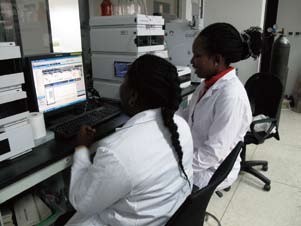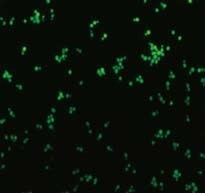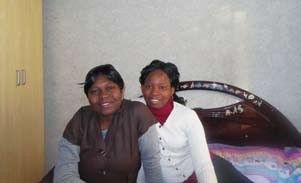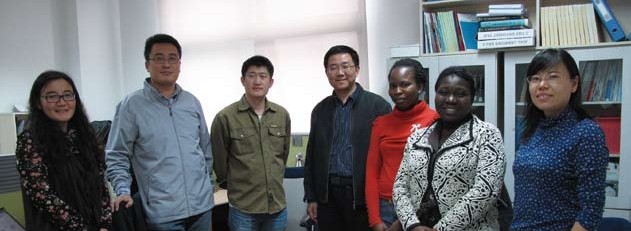| Cultivating Industrial Biotech Ecology for Homeland from Beijing |
|
| 2016-11-04 |
— Winners of CAS-TWAS Fellowship for Postgraduate Research and Their Host Prof. LI Yin at IMCAS
“Hi!” Stepping out of the lift in a new academic building of the CAS Institute of Microbiology (IMCAS), I was greeted by a warm, radiant smile. I could hardly identify this brisk, outgoing woman with the timid, worried-looking one I met just two months before, when she had just arrived at IMCAS from Nigeria. But it was Ijeoma Onyinyechi, of course, whom I met in August when she just joined the group led by Prof. LI Yin at IMCAS for one year’s PhD study, supported by the CAS- TWAS Postgraduate Fellowship. “Happy to see that you are much happier than two months ago,” I smiled. “Oh, at that time I was a bit worried about the food here, and everything looked strange... But now everything is OK, and I kind of like the food now,” she laughed with a bit of shyness. “Everybody is ready to help me, and things are much easier now,” she added.
Ijeoma happily introduced to me her Nigerian fellow Oriola Olasunkanmi Bukola, also a winner of the CAS- TWAS Postgraduate Fellowship. They are both studying industrial biotechnology at the Laboratory of Molecular Physiology and Systems Biotechnology of IMCAS under Prof. LI Yin, who serves as Director of the CAS-TWAS Centre of Excellence for Biotechnology affiliated at IMCAS.
Learning for Future
Before pursuing her PhD at the University of Port Harcourt, Port Harcourt Rivers State in Nigeria, Ijeoma took some practical courses in industrial microbiology and worked as a quality control officer at a farming company in Nigeria.

Ijeoma (right) and Oriola working at the lab. (Photo by SONG J.) “I chose this group because here I find it provides me with some privileges that I didn’t have back home and will widen my view. Another reason is, I need to learn more about what is still lacking back home,” Ijeoma explained her reasons to study at IMCAS. Also Ijeoma described potential applications of what she would learn here in newly sprung industries in her home country: “In my country a lot of industries are springing up and everyone has taken interests on the fermentation of foods from locally manufactured materials and standardization of such indigenous fermented foods. I think from what I have learnt, my country will gain a lot.” Ijeoma is learning at LI’s group a technique to express some proteins through cultivating a kind of microbes. “Presently I’m working on Pichia pastoris, which is a yeast, for expression of proteins,” said Ijeoma. According to Prof. LI Yin, her host, what Ijeoma is learning is a protein-secretion system, a microorganism that can largely secrete proteins. Theoretically this system can secrete any proteins of interest, including those vital for food industry in many different areas. “I will be able to produce other proteins needed for our industries when I am back in Nigeria, using this yeast,” Ijeoma smiled with confidence.  
Microscopic images of Pichia pastoris GS115 (pGapZEGFP), a strain of yeast with which Ijeoma is working. This strain can express a protein which exhibits green fluorescence under a fluorescence microscope (right). Pichia pastoris wild type strain GS115 does not show fluorescence itself. (Images by Ijeoma) Her fellow Oriola, who arrived about two months later than her, held similar expectations concerning future opportunities back home, and expressed her yearnings to help boosting the growth of her home country. “When we get home, we will be among those who have learnt the advanced techniques. This will give us the opportunity to disseminate to the young scientist the knowledge we have gained here. We still have challenges in terms of research in our country, but thanks to TWAS and CAS for this opportunity to come here, I’m sure things will improve.” According to Oriola, who is currently a PhD student at the Federal University of Technology Akure, Nigeria, what IMCAS is working on is quite new to researchers in her home country. “One step at a time we will make some difference, though we ask ourselves questions like ‘are you sure this kind of biotechnology worthy’? But with what we will learn here we will be able to clarify this to them, even though it may be tough, I am optimistic that with time, things will be better,” she said. Bridging Academia and Industry LI’s group enjoys good reputation in general, running the Laboratory of Molecular Physiology and Systems Biotechnology, a world-class lab in the field of biotechnology. This lab is dedicated to understanding the physiology of industrial fermentation from the molecular level and improving the performance of industrial microorganisms using systems biotechnology approach. Drawing on research results from fundamental research areas including genomics, he is dedicated to “interfacing research and industry” in the field of biotechnology. Taking root in fundamental research, LI’s lab aims at solving practical problems proposed by the industry. His lab has been networking with many industrial partners, among which there are several international enterprises like Shell in UK, DSM in the Netherlands, and Nestlé in Switzerland. They are also cooperating with many big domestic companies including some state-owned enterprises, like Yanjing Brewery and other leading companies. “To address practical problems we need some very basic and very advanced life-science techniques,” LI explained. Noting that most biotech enterprises in China are reluctant to invest in R&D activities and largely rely on foreign licenses for new methods and technology, he set his mind on bridging this gap via R&D serving for the technological needs of the industry. “This is my personal interest and I would like to spend most of my energy to close it up — as close as we can,” he continued. When asked about future jobs they would prefer between academia and industry after graduation, Ijeoma said that after finishing her PhD and postdoc, she would prefer to work where she could still have the opportunity to practice the experiments and come up with more innovative ideas. “So... I will weigh the options, to see which one offers me a better chance of achieving my dreams. Basically it would be research, to produce something innovative.” Oriola seemed to be well driven to pursue an academic career. “I would like to become a lecturer,” she said. “You know we’ve got an opportunity here to learn, though we need to know more research techniques. So what I have learnt here will have impacts on the upcoming ones in my school which I know they will benefit from it. This is the advantage of our being here,” she asserted. Self-Driven Learners Dr. WANG Ruiyan and Ms. ZHAO Qiuwei, both staff at the lab led by Prof. LI Yin, are well impressed by Ijeoma and Oriola’s hard work: “They spend long hours on their experiments, with the awareness that they have got precious opportunities to learn here.” “The experiments are attractive, and sometimes you are so excited that you forget the time. You only realize it is late when you step out of the building and see everywhere is dark,” Ijeoma laughed when asked about how many hours they generally spent a day in the lab. “But it is very safe here around the campus, and our dormitory is just about 10 minutes’ walk from here, therefore it is fine,” she added. “You just carry on before you know it is late,” Oriola echoed her fellow. 
Ijeoma and Oriola with their host, Prof. LI Yin, a TWAS Young Affiliate. (Photo by SONG J.) “I still remember Oriola’s proposal was really well written,” remarks LI Yin recalling why he chose to enroll them. “Not just that she spent due energy addressing the proposal. It is all too often that applicants do not know what they are to do during their stay here, but obviously they are very clear about their own objectives.” The protein secretion system Pichia pastoris was chosen by Ijeoma herself as her target technique to learn at LI’s lab. LI gave Ijeoma and Oriola opportunities to talk to everybody in the lab about their respective projects, and also discuss with their supervisors in Nigeria to decide which ones could be of interest. After series of discussions, Ijeoma decided to work with Pichia. “Because once you learn this technique, you can take such a system back to Nigeria, and adapt it to express any other protein; theoretically you won’t have difficulty in producing different proteins. That’s something we’d like her to learn specially and get information that will be useful when she’s back home,” LI explained: “She had the freedom to talk to everybody before choosing her project. It is her choice, because we believe that interest is the motivation for doing research: if you are not interested, you are not properly motivated.” Ijeoma and Oriola can also continue working on their own PhD topics brought from their home universities, suggested Prof. LI. Due to financial reasons, however, the lab has difficulty to provide substantial support for their PhD topics, which are not covered by the spectrum of his lab’s research interests. Oriola, who arrived only in late September, was still at the stage talking with different teams at the lab to choose a suitable project. “I just came, trying to see what the teams are working on, and what I find interesting. They have really gone far in biotechnology, therefore I will have to work very hard. I plan joining one of the teams, and probably during this time I can also do some work on my own PhD research.” Her PhD topic is on the ecology of organisms from some fermented beverages, which will meet the needs of industrialization in Nigeria. “My objectives are to identify the organisms, then develop some bacteria strains that can be manipulated to produce a high quality beverage… But certainly I still like what is going on at this laboratory, and would like to join them,” remarked Oriola. Life in CAS People might be curious whether international students at CAS have difficulties communicating with their Chinese fellows. Ijeoma and Oriola, however, said that they had no difficulty at all. “No. I don’t have any problem,” responded Ijeoma: “The staff and students vary in terms of English level; but they are really lovely people to work with. There is fun too, and I really like to work with them.” According to Prof. LI Yin, generally PhD students speak good English, and some technicians with Master’s degrees are fairly good. “As Ijeoma said, some people can communicate and understand them very easily, and some will understand if you slow down and speak word by word. Actually having international students here has made it more natural for the team members to speak English at seminars and group meetings, which is what I would like to see,” LI said with satisfaction. On the other hand, both Ijeoma and Oriola are happy with their living in Beijing, with their fellowship well covering their living expenses and no tuition fee to pay. “The accommodation is a bit expensive, costing about one third of our monthly allowance,” said Ijeoma: “But it is OK, because the food is not so expensive, as long as you try to integrate and do not buy the imported foods. That would get high in price,” she laughed. 
Ijeoma and Oriola live in single rooms in a three-bedroom flat, which is about 10 minutes walk from IMCAS, sharing a kitchen and a living room with another student. (Photo by courtesy of Ijeoma and Oriola.) “Roughly, after deduction of fees for accommodation, their monthly allowance is good enough to support a living as comfortable as local students,” explained LI: “and they do not need to pay any tuition fee.” “I love everything here, and I am already feeling that I would like to come back,” Oriola said with a bright smile. Unfolding Story Looking back, Ijeoma and Oriola told their stories regarding how they got linked to the CAS-TWAS Fellowship Program and LI’s laboratory. “It’s a bit strange,” recalled Oriola: “At my previous school, there was a lecturer who came to CAS for this same programme, and he presented a seminar after he returned from CAS, China. He was commended by everyone and I thought to myself ‘this is wonderful’, so I went to meet him and he told me about TWAS-CAS. Then I went in search of a host supervisor in the website, fortunately for me I saw Prof. LI’s profile. I was happy because all I wanted to work on was embedded in his previous research and thought oh, this is wonderful,” she laughed. She went for her dream -- she logged in the website of TWAS Regional Office for East and Southeast Asia and applied for the opportunity. She made it. Ijeoma got to know the fellowship from her neighbor, a TWAS Young Affiliate who visited CAS in 2006 and 2007. “I visited him one Sunday evening and in the course of our conversation he mentioned and explained the TWAS- CAS fellowship programme to me. Later he forwarded my curriculum vitae and hoped it could help. After some time, I had a mail from Prof. LI.” All this seems to be a beautiful story that is still gradually unfolding; and Prof. LI has a plan to make it easier for potential applicants to reach their potential hosts. A plan of the CAS-TWAS Centre of Excellence led by LI Yin is to collect information of professors from different CAS institutes who are working in the area of biotechnology, and post it on the website of the Center. “We will put on our website the information of the professors whoever would like to recruit and supervise students from developing countries other than China,” introduced LI. “Before posting their information on this website, we will send an email to the professors to ask for permission. We will inform them that if they agree to put their information here, it will imply that they are willing to accept students from developing countries other than China. Probably we can collect the information of over one hundred supervisors who are majoring in medical biotechnology, food biotechnology, industrial biotechnology and other branches of biotechnology. People from developing countries who are interested in applying CAS-TWAS Fellowships to perform research in the field of biotechnology, might all benefit from this one-stop portal, or directory of supervisors,” he said. (BCAS) 
Ijeoma and Oriola with the staff of Prof. LI Yin’s group. (Photo by SONG J.)
|
|